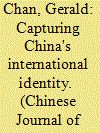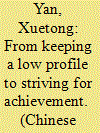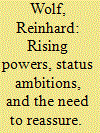|
|
|
Sort Order |
|
|
|
Items / Page
|
|
|
|
|
|
|
| Srl | Item |
| 1 |
ID:
131999


|
|
|
|
|
| Publication |
2014.
|
| Summary/Abstract |
What is China's international identity? How has it changed over time, especially since the reform and opening up of the country in the late 1970s? How does China see itself? And how do other countries see China? I argue that answers to these questions are instrumental to a proper understanding of Chinese foreign-policy behaviour, in ways more significant than we normally assume. To advance this argument, I choose to examine China's social interactions with the outside world to ascertain the evolution of its international identity/identities. I shall trace the domestic sources of China's external policies. In so doing, I hope this article will elucidate the 'debates' between social constructivism and realism as to their relative explanatory power with respect to the making of Chinese international identity. I also hope it will throw light on a possible alternative framework, known as social evolution, for studying China's international relations and its evolving identities.
|
|
|
|
|
|
|
|
|
|
|
|
|
|
|
|
| 2 |
ID:
131996


|
|
|
|
|
| Publication |
2014.
|
| Summary/Abstract |
Since 2012, some scholars, both Chinese and foreign, have argued that China's assertive foreign policy is doomed to fail. Nevertheless, after examining China's foreign relations in the last two years, this paper finds that China has experienced improved relations rather than deteriorating ones. In comparison with the strategy of keeping a low profile (KLP), the strategy of striving for achievement (SFA) shows more efficiency in shaping a favorable environment for China's national rejuvenation. The author applies the theory of moral realism to explaining the role of the SFA strategy and argues that morality can increase both international political strength and the political legitimacy of a rising power. The key difference between the KLP and the SFA is that the former focuses on economic gains and the latter seeks to strengthen political support. That is the reason that the SFA values the role of morality and the KLP does not. Due to these different goals, the SFA strategy differs from the KLP strategy in aspects of tenets, general layouts, working approaches, and methods. So far, the SFA has achieved progress beyond people's expectation from Xi Jinping in 2012. Xi's strong leadership may become a new case suitable for illustrating the theory of moral realism.
|
|
|
|
|
|
|
|
|
|
|
|
|
|
|
|
| 3 |
ID:
131998


|
|
|
|
|
| Publication |
2014.
|
| Summary/Abstract |
Rising powers have attracted tremendous interest in international politics and theory. Yet the ways in which secondary powers strategically respond to regional changes in the distribution of power have been largely neglected. This article seeks to fill this gap by presenting a systematic comparative analysis of the different types and causes of contestation strategies undertaken by secondary powers. Empirically, it focuses on two contentious regional dyads in East and South Asia, exploring how structural, behavioral, and historical factors shape the way in which Japan and Pakistan respond, respectively, to China's and India's regional power politics. The article concludes that the explanatory power of these factors depends on the respective secondary power's particular context: in the case of Japan, China's increasingly assertive regional behavior combined with a nontransparent military buildup has invoked the most significant strategic shifts, while in the case of Pakistani contestation, an increasing threat perception in the late 1980s led to the return to a pre-1971 revisionist agenda, whereas the overt nuclearization in the late 1990s mitigated India's growing conventional superiority and enabled Islamabad to replace soft balancing with more direct means of hard balancing.
|
|
|
|
|
|
|
|
|
|
|
|
|
|
|
|
| 4 |
ID:
131997


|
|
|
|
|
| Publication |
2014.
|
| Summary/Abstract |
This article focuses on the ominous parallels between the rise of Germany before World War I and China's ongoing ascendance. It will demonstrate that concerns about national status strongly affected both the fateful escalation of the 1914 crisis and the growing antagonisms of the years preceding. Special emphasis will be given to the role that mutual 'misrecognition' played in the gradual deterioration of Anglo-German relations. The consequences of Germany's excessive fixation on status are highly relevant for contemporary China, due to the startling similarities between both countries' domestic and international settings. If China wants to avoid the policy errors that led to the Kaiserreich's self-encirclement it needs to pay more attention to dangerous feedbacks among ongoing power shifts, maritime security dilemmas and extravagant public status concerns. China should do more to ensure that external trust in its benign intentions grows faster than its international ambitions and military power. This requires, among other things, an early settlement of ongoing territorial disputes, a toning down of jingoistic domestic discourses, enhanced leeway for speakers advocating international cooperation, and higher investment in multilateral institutions. Beijing's partners, for their part, must encourage such self-binding policies by facilitating China's rise in status, specifically by giving Beijing a greater say in these institutions
|
|
|
|
|
|
|
|
|
|
|
|
|
|
|
|
|
|
|
|
|